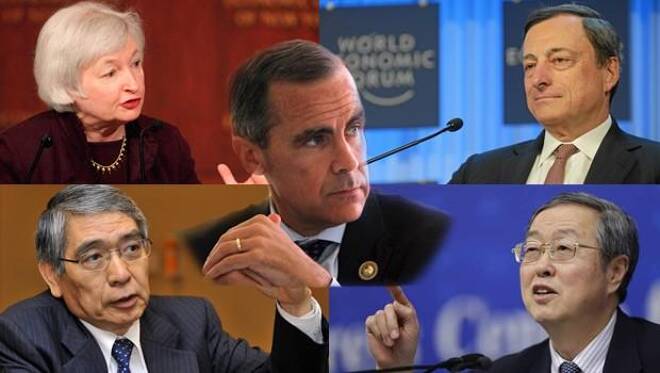Advertisement
Advertisement
Central Banks Controlling Forex Factor
By:
December is about to become the most exciting trading month of the year. Thursday the ECB will reveal their plans to help the Eurozone sagging economy.
The dollar edged higher on Monday, locking in its best monthly performance since the beginning of the year as investors braced for a long awaited interest-rate increase by the Federal Reserve, which many expect to be delivered in December. The dollar was up 0.2% on the day to 100.16 late Monday in New York. It rose as high as 100.31 earlier in the session, its highest level since March. This morning the greenback remains at 100.12. The dollar index gained 3.4% in November, its biggest monthly performance since a 5% gain in January.
Forex trading in November was dominated by headlines from central bank officials. ECB President Mario Draghi and his colleagues reiterated that the central bank would likely implement further easing, which may involve expanding its massive bond-buying program and cutting its already-negative deposit rate.
Fed officials, most notably Chairwoman Janet Yellen and Vice Chairman Stanley Fischer, assured markets that the Fed believes the U.S. economy could stomach a rate increase. The euro gave up 4% in November to trade at $1.0568 late Monday, its lowest level since mid-April. The euro is holding at 1.0579 this morning.
The yen shed 2% of its value in November, driven lower by comments from Fed policy makers. One dollar bought ¥122.87 after comments from Bank of Japan Kudora. The Bank of Japan bucked investor expectations in October by declining to expand its own program of asset purchases.
This morning the Reserve Bank of Australia held rates and policy helping the Aussie to gain 43 points against a weaker US dollar. The Aussie is trading at 0.7269 while the kiwi rose on the interest differential between the two central banks. The kiwi is up 45 points ahead of tonight’s Dairy auction. The NZD is holding at 0.6629. Data from China showed a continued decline in manufacturing PMI coming in below forecasts and showing a continued contraction in the sector. The private Caixin report was a bit better than expected but than forecast. The official purchasing managers index fell to 49.6 in November, the National Bureau of Statistics said Tuesday — the lowest level since August 2012. That compared with a median estimate of 49.8.
About the Author
Barry Normanauthor
Advertisement
